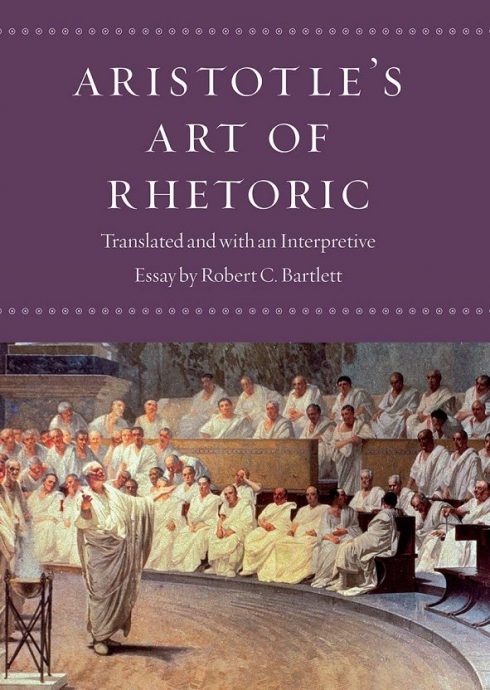Walter Berns should have an influence among future students, teachers, and devotees of American constitutional democracy.
Reason and Rhetoric
Robert C. Bartlett has made Aristotle’s Art of Rhetoric accessible to contemporary readers with his literal but elegant translation. His numerous notes that explain Aristotle’s historical and literary allusions as well as the subtleties of Aristotle’s Greek are indispensable for following Aristotle’s text. Finally, his interpretive essay guides us through the complexity of Aristotle’s Rhetoric, whose purpose is at the same time practical and theoretical, political and philosophical, a handbook for orators and an inquiry into truth and human community. Bartlett’s own purpose is also both theoretical and practical—to illuminate the issues Aristotle raises and to defend rhetoric against its modern or enlightenment critique as well as its postmodern embrace. The former depreciates rhetoric as a tool of manipulation and deception in contrast to rational discourse, while the latter insists that rational discourse itself is rhetorical in nature. Aristotle’s work, in contrast, attempts “to bridge the chasm” between reason and rhetoric, without replacing rhetoric with reason, or reason with rhetoric. As such, Aristotle’s Rhetoric is as essential for democratic self-government. It is especially relevant today when political speech is often held in contempt, when the first response of reporters must be “fact-checking,” and when “fake news” seems all the news there is. In such a climate of distrust, responsible citizens turn away from politics in disgust and irresponsible ones join the fray with their own competing narratives. As Bartlett leads us to expect, Aristotle’s Rhetoric offers a healthy correction to current ways of thinking about politics and about what we can expect of political leaders.
At the heart of Aristotle’s analysis of rhetoric, as Bartlett points out in his interpretive essay, are the three “proofs” (pisteis) of rhetoric, as the word is often translated, or “modes of persuasion,” as Bartlett translates it. Although the word has an ordinary meaning, “trust,” “faith,” “conviction,” or “belief,” Aristotle uses it in a special sense to refer to the reasons rhetoric is persuasive, namely, the character of the speaker as it is revealed in the speech, the passions his speech arouses in the hearer, and the speech itself. Because Aristotle means “what prompts one to trust or have faith in or give credence to” something or someone, Bartlett is right that translating pistis as “proof,” which suggests a logically sound argument, is misleading. Bartlett’s less precise “modes of persuasion” is better than “proof” as well as the more accessible “means of persuasion,” because it highlights Aristotle’s novel use. We might call bribery, for example, a means of persuasion, but not a mode. What is a “mode” of persuasion? The translation preserves the question, even if it does not preserve the link between persuasion and trust. Aristotle’s novel use of the word alerts us to his having discovered something about rhetoric that has eluded his predecessors, or at least that he thinks that he has done so. Good rhetoric gives us cause or reason to trust speeches or arguments about the good, the noble, and the just. It does this to different degrees on the basis of such things as the character of the speaker that his speech projects, the passions in the listeners that he evokes, and the quality of the argument itself. Without such “reasons to trust,” rhetoric would be mere manipulation, coercion, or force, or simply a display that we would have no more reason to accept than to reject.
Elevating Rhetoric
Bartlett gives a persuasive account of the many ways in which Aristotle’s work elevates rhetoric, especially in contrast to the way in which rhetoric was treated in the Platonic dialogues. The full title of Aristotle’s work, for example, is The Art of Rhetoric. An art is a making accompanied by reason and one of the ways we attain truth, as Aristotle defined it in the Nicomachean Ethics. By implication, Socrates was wrong in the Gorgias to insist that rhetoric is not an art, rather than a “knack” coming from experience, a sort of flattery that appeals to pleasure rather than the good and that teaches nothing. So too “Aristotle continues this defense or elevation of rhetoric,” in Bartlett’s words, by calling rhetoric the “counterpart of dialectic,” a branch of logic, in contrast to Socrates’s referring to it as “the counterpart” of nothing more elevated than fancy cooking (212). For Aristotle, in contrast, both rhetoric and dialectic “take as their subject matter whatever may fall within the purview of human reason or speech.”
Bartlett’s point is confirmed by Plato’s treatment of rhetoric in the Phaedrus, where Socrates saves rhetoric from criticism only by collapsing it into dialectic, and restricting it to speaking what is fitting to different types of souls, that is, proceeding in the way Plato portrays Socrates in his dialogues. The genuine art of rhetoric, from this perspective, is practiced in private, not in public settings. Aristotle’s “rhetoric,” in contrast, speaks to crowds, whether it be the rhetoric of the assembly, which deliberates about what is advantageous or good, “epideictic” rhetoric, which praises or blames in light of the noble and the shameful, and the forensic rhetoric of the courts, which defends justice and blames injustice. By the same token, Aristotle elevates political speech, and political life itself. As Bartlett observes, “the dignity and gravity specific to political life are more in evidence in Aristotle than in Plato.”
Bartlett’s essay properly raises questions as to whether Aristotle’s bridge between rhetoric and reason ultimately succeeds in connecting them. For example, while Aristotle’s association of rhetoric with dialectic elevates the former, it also distinguishes the two. Does rhetoric fall short of dialectic? How does Aristotle distinguish them? Aristotle “dubs” the rhetorical syllogism, which he distinguishes from a dialectical one, an “enthymeme.” Aristotle’s discussion of the enthymeme, and therewith its difference from a dialectical syllogism, however, is “brief and enigmatic.” This word, which was used hitherto in Greek literature to refer to “heartfelt words,” or reflections or thoughts coming from the heart or spirit (thumos), is put to new use by Aristotle. Bartlett discusses several attempts made by scholars to explain what Aristotle means by an enthymeme, all inconclusive. Is it a truncated syllogism from which a premise is missing? One that is true only for the most part? One whose premises come from common opinion? Later Bartlett mentions Aristotle’s advice to orators to “use words in their prevailing sense, so that audiences immediately grasp their import.” In explaining the rhetorical syllogism itself, Aristotle appears to violate his own advice to rhetoricians.
Is his treatment of the enthymeme a way of giving weight to rhetorical reasoning that that it cannot sustain? Bartlett suggests as much when he speculates that Aristotle uses the word “enthymeme” “because the syllogism at work in rhetoric depends so much on the existing opinions, the heartfelt convictions or prejudices, of the audience.” Such opinions “are clearly inferior to the truth.” In Bartlett’s words, “That Aristotle wishes to teach the art of rhetoric means that he must avail himself of an art different from rhetoric—which is not to deny that he also exercises something of the rhetorical art in so doing.” Indeed, “Aristotle blurs the line he has drawn between rhetoric and sophistry.” Aristotle’s claim that persuasion in rhetoric is only “a sort of demonstration” means that “it may not be a demonstration, strictly speaking, at all.”
The Limits of Rhetoric
Along the same lines, Bartlett finds that Aristotle’s discussion of deliberative rhetoric teaches us that “the understanding of the given end or principle that guides every political community is defective,” and so “it falls to the skilled orator, not to elevate that understanding, but to make good use of it.” In support of this observation is Aristotle’s “more nuanced” treatment of the good in the Ethics, which indicates just “how low the ceiling” of Aristotle’s Rhetoric is. The Rhetoric “deals in large measure with [generally-received opinions] rather than Aristotle’s own judgment of things.” Aristotle’s treatment of the praise we offer to virtue’s nobility or beauty “could well seem to be little more than an exhortation to others to benefit us.” Most troubling of all is judicial rhetoric, which involves the just and the unjust, for “the possible weakness of justice in the world” “must have its effect on the practice of a decent rhetoric.” Because rhetoric that does not appeal to pleasure and pain “seems doomed to fail,” justice “must yield to a kind of necessity.” Consistent with such discoveries is Aristotle’s treatment of the passions: after criticizing past writings about rhetoric for their emphasis on the judicial rhetoric, which appeals to the anger, envy, or pity of the jurors, Bartlett points out, Aristotle himself spends the considerable time showing his reader how to do this very thing.
In Aristotle’s defining the task of rhetoric as “seeing the persuasive points that are available in each case” rather than persuading, Bartlett finds a “sober assessment of the limits of persuasion” (219). Of course, it was Plato who had a sober assessment of the limits of persuasion, as Bartlett’s initial contrast between Aristotle and Plato suggests. But just as Aristotle implies his agreement with Socrates by bringing pleasure into the operations of rhetoric, Aristotle returns to Socrates after treating rhetoric’s modes of persuasion. Bartlett finds “a cluster of references” to Socrates that suggest that “the fate of Socrates lies behind the whole of this section of the Rhetoric and gives it both a unity and a gravity it would otherwise lack.” The cluster includes reference to the envy provoked by the wise, to father-beating, to a Spartan who (like Socrates claims of himself in the Apology) tested an oracle, to Euripides—“that friend of Socrates”—who spoke of the difficulty in persuading the many, and the opinion of the orator Alcidamas that all honor the wise, with Aristotle’s list of honorees from which Socrates is conspicuous by his absence. In sum, from Aristotle’s allusions in this section of his Rhetoric, there gradually emerges “the tension between the political community and wisdom or philosophy.” It is the limits of political life, presumably, that give politics its gravity, and not the possibility that politics be shaped by speech about the good, the noble, and the just. This is not a gravity that either Socrates or Plato would deny. Bartlett’s emphasis in the end gives more weight to “the chasm between impotent truth and potent opinion” than to any bridge Aristotle’s rhetoric could supply.
The Dignity of Politics
Those interested in the dignity as well as the gravity of political life will also find Bartlett’s commentary an invaluable resource. The difficulties and paradoxes in common opinion that Bartlett so carefully uncovers reveal not only confusions but truths to which a high-minded rhetoric can appeal or on which it can be based. When Bartlett points out the literal meaning of enthymeme, for example, as “reflections coming from the heart or spirit,” he lets us see not so much the “heartfelt prejudices” of the audience but the connection between the passions and reason of both speaker and addressee that is so important to Aristotle’s Rhetoric. The orator’s disposition toward his passions—his character—revealed in a way that resonates with his audience, are among the causes of trust or persuasion. When Aristotle explains that rhetoric does not deal with necessary truths, as does knowledge or science, but rather with those “things that for the most part admit of being otherwise,” his point is not that rhetoric falls short of the truth, but that it indicates the human capacity to deliberate and to act—to have an effect on what might be otherwise. It is such matters that rhetorical syllogisms or enthymemes involve. In praising, Aristotle says, “one must lead what is honored in the direction of the noble.” Although Bartlett claims that the places in the Rhetoric are “relatively rare” in which Aristotle “seeks not just to record ordinary opinion but to leaven it,” Bartlett’s silence about other such places, like this one, impels us to seek them.
So too does Bartlett’s discussion of equity in the Rhetoric, which explicates what is just by nature, point not simply to the limits of the law but also to an orator’s opportunity to direct it to justice. Bartlett’s account of equity in the Rhetoric lays out how it deepens Aristotle’s treatment of equity in the Ethics. Among the examples Aristotle gives of what is just by nature is the prohibition against killing all animate beings. That Aristotle calls this prohibition “something that all people divine,” Bartlett dubs as “bizarre,” inviting us to look further into its meaning, perhaps into the goodness of life, especially those who are able to divine such goodness. When Aristotle suggests that slavery is by nature unjust, Bartlett finds this qualified by Aristotle’s endorsement of natural slavery in the Politics. By pointing to the Politics, Bartlett lets us question whether the Rhetoric’s more negative view of natural slavery helps us interpret any apparent endorsement one finds in the Politics. That “justice is praised because it is the inclination to benefit others” (emphasis Bartlett’s), whether or not it is “a typical confusion concerning its goodness,” offers evidence of our “political” nature—that our good is inextricably tied to the good of others. It is quite possible, moreover, that Aristotle’s cluster of allusions to the failure of Socrates’s rhetoric in court point to Aristotle’s hope that his Art of Rhetoric presaged a more harmonious relation between the philosopher and the political community.
In all these ways and in so many others, Bartlett’s findings of anomalies and paradoxes push against any “low ceiling” the Rhetoric might be thought to have in comparison with Aristotle’s other works. Bartlett tends to understand Aristotle’s statement that rhetoric resembles the truth as a way of separating the two rather than of connecting them. It is the latter reading that allows a bridge between rhetoric and reason, which answer both Enlightenment critics of rhetoric and postmodern celebrants of it. We must discover how Aristotle’s Rhetoric brings light into what Socrates saw as the political “cave,” without succumbing to Enlightenment naiveté to address those who revel in its darkness.



